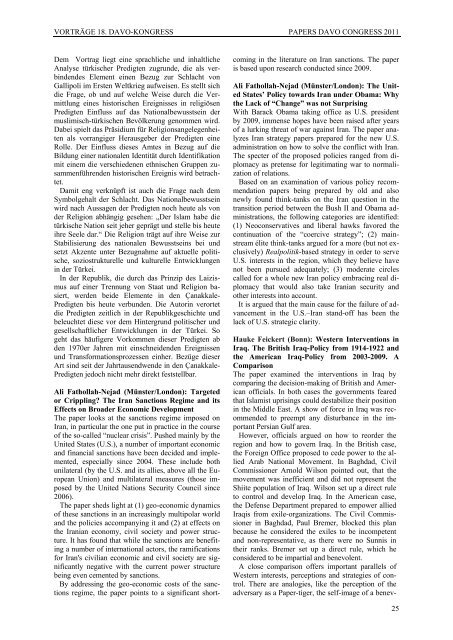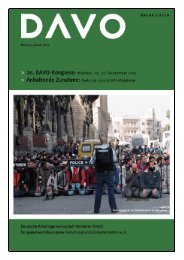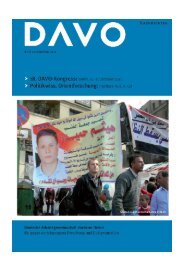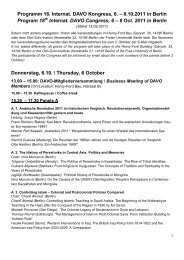4 Dissertationen und Habilita- tionen / Dissertations and Habilitations
4 Dissertationen und Habilita- tionen / Dissertations and Habilitations
4 Dissertationen und Habilita- tionen / Dissertations and Habilitations
Erfolgreiche ePaper selbst erstellen
Machen Sie aus Ihren PDF Publikationen ein blätterbares Flipbook mit unserer einzigartigen Google optimierten e-Paper Software.
VORTRÄGE 18. DAVO-KONGRESS PAPERS DAVO CONGRESS 2011<br />
Dem Vortrag liegt eine sprachliche <strong>und</strong> inhaltliche<br />
Analyse türkischer Predigten zugr<strong>und</strong>e, die als verbindendes<br />
Element einen Bezug zur Schlacht von<br />
Gallipoli im Ersten Weltkrieg aufweisen. Es stellt sich<br />
die Frage, ob <strong>und</strong> auf welche Weise durch die Vermittlung<br />
eines historischen Ereignisses in religiösen<br />
Predigten Einfluss auf das Nationalbewusstsein der<br />
muslimisch-türkischen Bevölkerung genommen wird.<br />
Dabei spielt das Präsidium für Religionsangelegenheiten<br />
als vorrangiger Herausgeber der Predigten eine<br />
Rolle. Der Einfluss dieses Amtes in Bezug auf die<br />
Bildung einer nationalen Identität durch Identifikation<br />
mit einem die verschiedenen ethnischen Gruppen zusammenführenden<br />
historischen Ereignis wird betrachtet.<br />
Damit eng verknüpft ist auch die Frage nach dem<br />
Symbolgehalt der Schlacht. Das Nationalbewusstsein<br />
wird nach Aussagen der Predigten noch heute als von<br />
der Religion abhängig gesehen: „Der Islam habe die<br />
türkische Nation seit jeher geprägt <strong>und</strong> stelle bis heute<br />
ihre Seele dar.“ Die Religion trägt auf ihre Weise zur<br />
Stabilisierung des nationalen Bewusstseins bei <strong>und</strong><br />
setzt Akzente unter Bezugnahme auf aktuelle politische,<br />
soziostrukturelle <strong>und</strong> kulturelle Entwicklungen<br />
in der Türkei.<br />
In der Republik, die durch das Prinzip des Laizismus<br />
auf einer Trennung von Staat <strong>und</strong> Religion basiert,<br />
werden beide Elemente in den Çanakkale-<br />
Predigten bis heute verb<strong>und</strong>en. Die Autorin verortet<br />
die Predigten zeitlich in der Republikgeschichte <strong>und</strong><br />
beleuchtet diese vor dem Hintergr<strong>und</strong> politischer <strong>und</strong><br />
gesellschaftlicher Entwicklungen in der Türkei. So<br />
geht das häufigere Vorkommen dieser Predigten ab<br />
den 1970er Jahren mit einschneidenden Ereignissen<br />
<strong>und</strong> Transformationsprozessen einher. Bezüge dieser<br />
Art sind seit der Jahrtausendwende in den Çanakkale-<br />
Predigten jedoch nicht mehr direkt feststellbar.<br />
Ali Fathollah-Nejad (Münster/London): Targeted<br />
or Crippling? The Iran Sanctions Regime <strong>and</strong> its<br />
Effects on Broader Economic Development<br />
The paper looks at the sanctions regime imposed on<br />
Iran, in particular the one put in practice in the course<br />
of the so-called “nuclear crisis”. Pushed mainly by the<br />
United States (U.S.), a number of important economic<br />
<strong>and</strong> financial sanctions have been decided <strong>and</strong> implemented,<br />
especially since 2004. These include both<br />
unilateral (by the U.S. <strong>and</strong> its allies, above all the European<br />
Union) <strong>and</strong> multilateral measures (those imposed<br />
by the United Nations Security Council since<br />
2006).<br />
The paper sheds light at (1) geo-economic dynamics<br />
of these sanctions in an increasingly multipolar world<br />
<strong>and</strong> the policies accompanying it <strong>and</strong> (2) at effects on<br />
the Iranian economy, civil society <strong>and</strong> power structure.<br />
It has fo<strong>und</strong> that while the sanctions are benefiting<br />
a number of international actors, the ramifications<br />
for Iran's civilian economic <strong>and</strong> civil society are significantly<br />
negative with the current power structure<br />
being even cemented by sanctions.<br />
By addressing the geo-economic costs of the sanctions<br />
regime, the paper points to a significant short-<br />
coming in the literature on Iran sanctions. The paper<br />
is based upon research conducted since 2009.<br />
Ali Fathollah-Nejad (Münster/London): The United<br />
States’ Policy towards Iran <strong>und</strong>er Obama: Why<br />
the Lack of “Change” was not Surprising<br />
With Barack Obama taking office as U.S. president<br />
by 2009, immense hopes have been raised after years<br />
of a lurking threat of war against Iran. The paper analyzes<br />
Iran strategy papers prepared for the new U.S.<br />
administration on how to solve the conflict with Iran.<br />
The specter of the proposed policies ranged from diplomacy<br />
as pretense for legitimating war to normalization<br />
of relations.<br />
Based on an examination of various policy recommendation<br />
papers being prepared by old <strong>and</strong> also<br />
newly fo<strong>und</strong> think-tanks on the Iran question in the<br />
transition period between the Bush II <strong>and</strong> Obama administrations,<br />
the following categories are identified:<br />
(1) Neoconservatives <strong>and</strong> liberal hawks favored the<br />
continuation of the “coercive strategy”; (2) mainstream<br />
élite think-tanks argued for a more (but not exclusively)<br />
Realpolitik-based strategy in order to serve<br />
U.S. interests in the region, which they believe have<br />
not been pursued adequately; (3) moderate circles<br />
called for a whole new Iran policy embracing real diplomacy<br />
that would also take Iranian security <strong>and</strong><br />
other interests into account.<br />
It is argued that the main cause for the failure of advancement<br />
in the U.S.–Iran st<strong>and</strong>-off has been the<br />
lack of U.S. strategic clarity.<br />
Hauke Feickert (Bonn): Western Interventions in<br />
Iraq. The British Iraq-Policy from 1914-1922 <strong>and</strong><br />
the American Iraq-Policy from 2003-2009. A<br />
Comparison<br />
The paper examined the interventions in Iraq by<br />
comparing the decision-making of British <strong>and</strong> American<br />
officials. In both cases the governments feared<br />
that Islamist uprisings could destabilize their position<br />
in the Middle East. A show of force in Iraq was recommended<br />
to preempt any disturbance in the important<br />
Persian Gulf area.<br />
However, officials argued on how to reorder the<br />
region <strong>and</strong> how to govern Iraq. In the British case,<br />
the Foreign Office proposed to cede power to the allied<br />
Arab National Movement. In Baghdad, Civil<br />
Commissioner Arnold Wilson pointed out, that the<br />
movement was inefficient <strong>and</strong> did not represent the<br />
Shiite population of Iraq. Wilson set up a direct rule<br />
to control <strong>and</strong> develop Iraq. In the American case,<br />
the Defense Department prepared to empower allied<br />
Iraqis from exile-organizations. The Civil Commissioner<br />
in Baghdad, Paul Bremer, blocked this plan<br />
because he considered the exiles to be incompetent<br />
<strong>and</strong> non-representative, as there were no Sunnis in<br />
their ranks. Bremer set up a direct rule, which he<br />
considered to be impartial <strong>and</strong> benevolent.<br />
A close comparison offers important parallels of<br />
Western interests, perceptions <strong>and</strong> strategies of control.<br />
There are analogies, like the perception of the<br />
adversary as a Paper-tiger, the self-image of a benev-<br />
25





